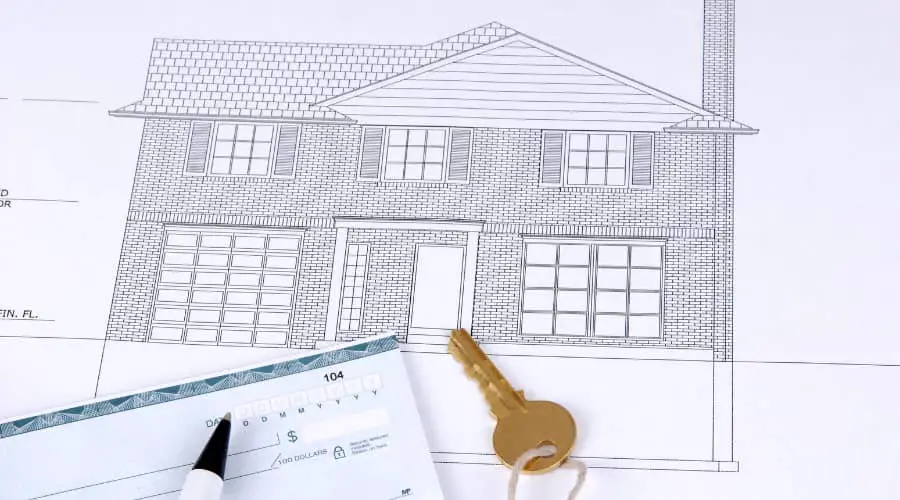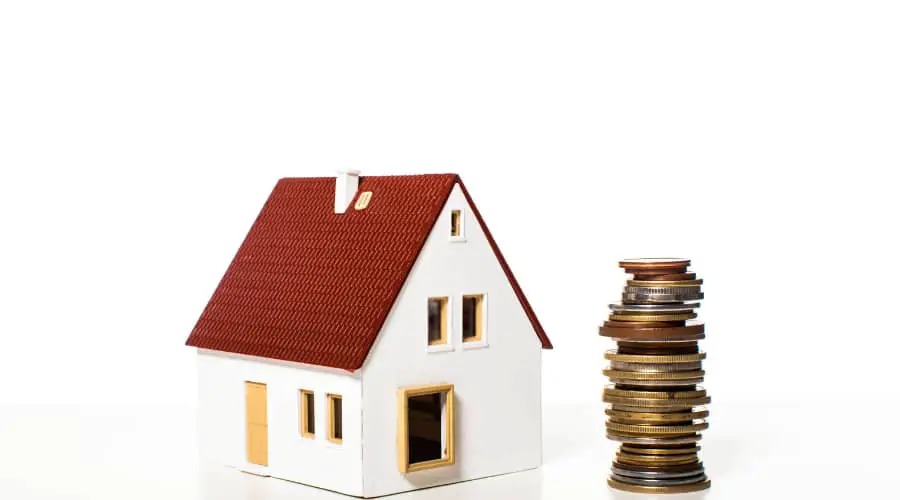Should you invest your house deposit in the stock market? This is a question that most financially-savvy first time buyers will ask themselves at some point.
Once you have saved up for a house deposit, it is not generally a good idea to invest this sum in the stock market. A hallmark of stocks is that they fluctuate over time, if your invested deposit is required during a market downswing, you may have less money available than when you started.
So, if your house deposit shouldn’t be invested in stocks, that begs the question, where should you keep your house deposit as you wait to purchase a property?
Should you invest your house deposit in the stock market?
You should not invest your house deposit in the stock market. The stock market is well known for fluctuating wildly over time. If a sum of cash earmarked for a property deposit is in the market during a market downturn, you may not have a sufficiently large deposit to make the purchase.
Consider the following example, let’s say you have saved up a £50,000 cash sum earmarked for your first home which you plan to purchase in one years time. Part of you may think of investing this in stocks. After all, on average, the S&P500 increases in value by around 10% per year, which would leave you with £55,000 at the end of the year.
An extra £5,000, just by putting the funds in an investment account seems like a good idea. However, the 10% average returns of the S&P500 are just an average. This means that some years it goes up 20% and other years it goes down by 15%.
As none of us can accurately time the market, it’s very tough to know what the following year will bring. Let’s say you invested the same £50,000 as mentioned above and the market declined by 10% in the year. Now your deposit is only worth £45,000 and when it comes time to buy your first property, you have a smaller deposit and are more limited in your choice of property.
There are some advantages of investing this money, the stock market is better protected against the erosive effects of inflation (your money becomes worth less over time) than an ordinary cash account would be. However, the risk of negative market fluctuations outweighs this inflationary risk, particularly given high-interest savings accounts are available.

Where should I put my house deposit savings?
House deposit savings should be kept in a high-interest bank account or in a Lifetime ISA if applicable. Both of these accounts are protected from the negative fluctuations of the stock market whilst providing returns that protect from the risk of inflation eating away at the value of your money.
A Lifetime ISA (LISA) is a form of ISA which allows people to save for retirement or their first home. Each year, the government will contribute 25% of whatever you contribute up to a maximum of £4,000, meaning the government could give you £1,000 per year in the best-case scenario.
For more information on LISA’s – please refer to my post ‘Should I invest in a Lifetime ISA (LISA) instead of a normal ISA?’
For those not utilising a LISA (if, for example, you are not a first-time buyer or the property value exceeds the maximum LISA allowance) the next best option is a high-interest savings account.
For the best savings accounts to keep your house deposit in, please refer to this MoneySavingExpert article for the best options.
The key consideration will be whether you’re willing to lock your money in for a set period of time. Doing so will allow you to access higher savings rate accounts known as ‘fixed-rate accounts’.
Should I keep my house deposit in physical cash?
You should not keep your house deposit saved in physical cash stored in your home. Not only will this money not be earning any interest or returns as it would in a high-interest savings account or LISA, is it at a much greater risk of being stolen or destroyed in a flood or fire.
There are those out there who are highly sceptical of modern banking or who operate in cash only businesses that enable them to save substantial amounts of physical cash under the metaphorical mattress.
Saving for a home deposit in physical cash strikes me as a bad idea for a number of reasons:
- Your physical cash will not earn any interest or government match as a high-interest account or LISA would.
- Your physical cash is much more likely to be stolen from your home than from a reputable bank.
- Your physical cash may be destroyed in a flood or fire which may be very difficult to recover.
- When it comes to purchasing the house, paying in physical cash may raise alarm bells over the legality of the funds.
Generally speaking, you would face much less risk keeping house deposits stored in a bank or a savings account provider than in physical cash.
Should you invest your house deposit in Cryptocurrency?
You should not invest your house deposit in Cryptocurrency. Much like stocks but to an even greater degree, Crypto values fluctuate significantly in the short term and it is very difficult to predict what their future value will be as the regulatory environment catches up with the technology.
Crypto is a poor choice for storing your house deposit due to the same reasons investing it in stocks are. Both asset classes are simply too volatile and the risk of having less than you started with when it comes to purchasing a property are substantial.
What is the best savings account for saving for a house deposit?
The best saving accounts for your house deposit will depend largely on your situation, including the amount of the deposit and the estimated time until purchase. Investec’s 0.71% savings account is a good option for many people due to unlimited deposits/withdrawals and instant access to savings.
Please refer the this MoneySavingsExpert comparison tool for the best savings accounts options. This should provide all of the key information including the number of permissible withdrawals/deposits, min and max deposit amounts and whether the account is instant access or ‘locked in’ for a specified time period.
Should I spend all my savings on a house deposit?
You should not spend 100% of your savings on a house deposit. Whilst a house deposit will be a major transaction for most, it is not prudent to spend 100% of your savings. You should set aside money for an emergency fund and leave some in reserve for the various fees associated with purchasing a home.
For example, if a house comes on the market which requires a £50,000 deposit and your total savings are £51,000, I would suggest waiting for a different property to become available or continuing to save for a few more months. The £1,000 you will be left with is not sufficient to cover the various fees of property purchases (solicitors fees, stamp duty etc) and will leave no savings in case of an emergency.
Whilst there is often a temptation to run into exciting moments like purchasing a house with both feet forward, I would advise some caution. Consider the situation where you use 100% of your savings on your house deposit and lose your job the month after you move in. Having used all your savings, you would have no cushion whilst you search for new work and be in a financially precarious position.

Should I use the stock market to build up my house deposit savings?
Whilst it is not advisable to keep your house deposit in stocks in the short term, the stock market can be a useful tool for accumulating wealth over the medium and long term. Therefore, if you are planning on buying a property in 5 years, stocks could be one way to reach your deposit goal faster.
As discussed above, the main issue with investing your accumulated home deposit in the stock market is that the negative market fluctuations could leave you without sufficient funds when the time comes to put your deposit to use.
However, if you plan to buy a property in five or ten years time and know you will need a certain amount, the stock market can be a really useful tool for getting there faster.
The only issue with this strategy is by selling your stock market positions, you cut short the compounding process which can result in significant wealth for retirement if left untouched for many years.
Should I invest in stocks or purchase my first home?
The decision on whether to invest or to purchase your own home is very personal and will be decided by your individual scenario and what house prices and rental rates in your area are like. Just because buying a home is the ‘standard path’ doesn’t necessarily mean it is the right path for all.
Many individuals would likely end up in a much better financial situation if they were to continue to rent and start to invest significant amounts into stock market funds. For example, if the rent: purchase price yield in your town is low, this can be the more logical option.
As with everything, non-financial decisions come into play such as the desire to own a place you can decorate and change as you please or feeling as if a home purchase is the next big life step.
Is £25,000 enough for a house deposit?
£25,000 is enough for a house deposit, depending on the total value of the property and how much you are able to borrow via a mortgage. Broadly speaking, a £25,000 deposit should allow you to purchase a property worth up to £250,000 providing you are in a position to borrow the remainder.
If you put down a deposit of £25,000 on a £250,000 property, the remainder (£225,000) would need to be financed via a mortgage. Broadly speaking, banks are willing to lend up to 4-5 times your annual salary, so to borrow £225,000 you would need to be earning at least £45,000 per year.
It is worth noting that this is calculated on household income, so if you are purchasing a property alongside a partner or spouse, your combined income would be considered for the total amount you are able to borrow.
Is £50,000 enough for a house deposit?
£50,000 is enough for a house deposit, depending on the total value of the property and how much you are able to borrow via a mortgage. Broadly speaking, a £50,000 deposit should allow you to purchase a property worth up to £500,000 providing you are in a position to borrow the remainder.
As always, please remember I am an Accountant, but not your Accountant. In this post (and all of my others) I share information and oftentimes give anecdotes about what has worked well for me. However, I do not know your personal financial situation and so do not offer individual financial advice. If you are unsure of a particular financial subject, please hire a qualified financial advisor to guide you.
This article has been written by Luke Girling, ACA – a qualified Accountant and personal finance enthusiast in the UK. Please visit my ‘About‘ page for more information. To verify my ACA credentials – please search for my name at the ICAEW member finder. Please comment below or contact me here to get in touch with questions or ideas for future posts.
